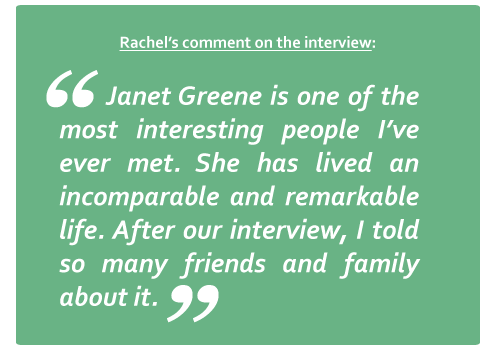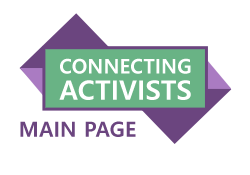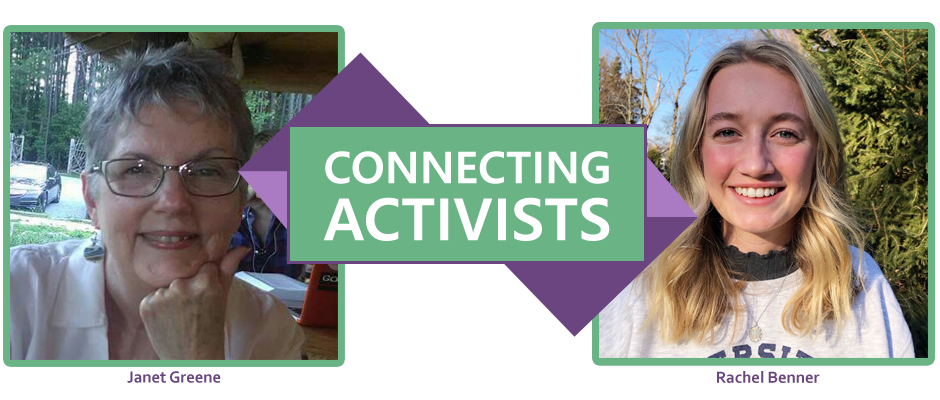Rachel Benner, Fordham University sophomore, interviewed Janet Greene in fall 2020
 In November, I had the opportunity to talk with historian, educator, and activist Janet Wells Greene. She is one of the most interesting and inspiring people I have ever met—to say she is an impressive woman is an understatement. Her mission is to make life better for people, especially the working class and those in poverty. Most recently, she has carried this out by creating The Freedom School, where she worked for ten years before retiring in 2019. The school—less like a building and more like a movement—was built on her educational philosophy and her own life experiences.
In November, I had the opportunity to talk with historian, educator, and activist Janet Wells Greene. She is one of the most interesting and inspiring people I have ever met—to say she is an impressive woman is an understatement. Her mission is to make life better for people, especially the working class and those in poverty. Most recently, she has carried this out by creating The Freedom School, where she worked for ten years before retiring in 2019. The school—less like a building and more like a movement—was built on her educational philosophy and her own life experiences.
Her work is centered around education. Influenced by Brazilian educator Paulo Freire, Janet’s philosophy is that education should be for community empowerment. People should understand the story of their lives and study their neighborhoods. Janet emphasized that “we need to understand what came before us, and we need to learn from the past.” In 2009, she and her husband moved from Brooklyn to Newark, Ohio, a town made up of factories and working people. From talking and observing, she learned that the population was suffering, and they tended to blame themselves or each other for what was happening. She knew the blame should instead fall on those in power and organizations just looking to make a profit at their workers’ expense. Nobody was listening to the people of the town. In response, she and her husband founded The Freedom School in Licking County with the help of other groups committed to making a change. In an article about the school, she wrote, “We want to provide opportunities for education to expose and eliminate the conditions that caused people to be unemployed, poor, and uneducated.”
Life experiences of her own led her to this work. Janet has three master’s degrees in English, Library Science, and History, and has a Ph.D. in American History. Even with these degrees, much of her work has been funded by grants, making it temporary. The search for jobs has forced her to live in 10 states throughout her life. Her first move, from West Virginia to Tennessee, was at the age of ten when they closed the coal mines her father worked at. Janet can relate to the struggles of the working class because she is a part of the working class. There were times she had little money because it had to go towards necessities or medical costs, so she understands the burdens that the people in Newark carried.
Her challenges have shaped her beliefs about poverty. Janet attributes poverty to people not getting paid liveable wages and not having enough money because of uncontrollable outside factors. “If you go to a food pantry and talk to the people about why they’re there, half will tell you that they are there because they had cancer, and the other half will tell you it’s because their job disappeared,” she said. She acknowledges that people can become poor in an instant and the absurdity and injustice in that. In 1997, before her move to New York, Janet started a food pantry in Ohio. When she returned years later, she found that the people getting food were treated as if they had no rights. They were only allowed a limited amount of food (depending on how many social security numbers they presented) and could only come once a month. She was horrified but was able to partially change the practice. This is an example she shared to illustrate the importance of learning about your community and how it operates. With this knowledge, people can “uncover the power relationships in their society” and strive to break free.
Another objective of The Freedom School comes from what Janet learned in her years spent in academia. She observed that oftentimes the purpose of education is to learn how to participate in academic conversations and share your research. But, she realized that nobody was talking to the people that lived through the history and issues they studied. A main goal of The Freedom School is to listen to and learn from people and create plans for change together from there. She also identified a big concern with current education: inaccessibility. Because individuals have to pay to learn, many people that work or cannot afford college lose the opportunity for education. Additionally, the books she read for research were dense and difficult to understand; she wants books with the same material formatted in an easier way to understand. The Freedom School intended to make education accessible to anyone willing to learn about their communities and how they are being stripped of their power. “We need to make sure the people in the present can understand what is being said without having to spend their whole lives studying so they can understand the conversation,” she explained.
In its entirety, the goal of Janet’s work and The Freedom School is to open the conversation to people struggling, listen to their concerns, and to train new leadership and work to solve them. Janet has learned that their problems and needs are different from what people studying from afar claim. Her mission was to notice these people and care for them, unlike those in power. The hope is that they stop misdirecting their blame to themselves. She says this process is difficult and long but well worth it. Janet Greene and her school is a catalyst for this change. “I want to be the crack in the ivory tower...the place where all the information gets out,” she expressed. “I want to tear down the wall.”


